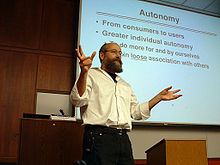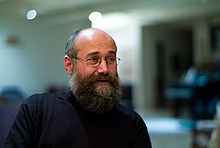- Yochai Benkler
-
Yochai Benkler
Yochai Benkler speaking at UC Berkeley School of law on 27 April 2006.Born 1964 Occupation Professor, Harvard Law School Spouse Deborah Schrag Children 2 Website www.benkler.org Yochai Benkler is an Israeli-American professor of Law and author. Since 2007, he has been the Berkman Professor of Entrepreneurial Legal Studies at Harvard Law School. He is also a faculty co-director of the Berkman Center for Internet & Society at Harvard University.
Contents
Biography
In 1984, Benkler was the treasurer of Kibbutz Shizafon.[1] He received his LL.B. from Tel-Aviv University in 1991 and J.D. from Harvard Law School in 1994. He worked at the law firm Ropes & Gray from 1994-1995. He clerked for U.S. Supreme Court Justice Stephen G. Breyer from 1995 to 1996.
He was a professor at New York University School of Law from 1996 to 2003, and visited at Yale Law School and Harvard Law School (during 2002-2003), before joining the Yale Law School faculty in 2003. In 2007, Benkler joined Harvard Law School, where he teaches and is a faculty co-director of the Berkman Center for Internet & Society. Benkler is on the advisory board of the Sunlight Foundation.[2] In 2011, his research led him to receive the $100,000 Ford Foundation Social Change Visionaries Award.[3]
Works
Benkler's research focuses on commons-based approaches to managing resources in networked environments. He coined the term 'commons-based peer production' to describe collaborative efforts based on sharing information, such as free and open source software and Wikipedia. He also uses the term 'networked information economy' to describe a "system of production, distribution, and consumption of information goods characterized by decentralized individual action carried out through widely distributed, nonmarket means that do not depend on market strategies." [4]
Benkler's 2006 book The Wealth of Networks [5] examines the ways in which information technology permits extensive forms of collaboration that have potentially transformative consequences for economy and society. Wikipedia, Creative Commons, Open Source Software and the blogosphere are among the examples that Benkler draws upon.[6] (The Wealth of Networks is itself published under a Creative Commons license). For example, Benkler argues that blogs and other modes of participatory communication can lead to "a more critical and self-reflective culture", where citizens are empowered by the ability to publicize their own opinions on a range of issues. Much of The Wealth of Networks is presented in economic terms, and Benkler raises the possibility that a culture in which information is shared freely could prove more economically efficient than one in which innovation is encumbered by patent or copyright law, since the marginal cost of re-producing most information is effectively nothing.
Benkler coined the term 'Jalt' as a contraction of jealousy and altruism, to describe the dynamic in commons-based peer production where some participants get paid while others do not, or "whether people get paid differentially for participating." The term was first introduced in his seminal paper "Coase's Penguin, or, Linux and the Nature of the Firm." It is described in more technical terms as "social-psychological component of the reward to support monetary appropriation by others or... where one agent is jealous of the rewards of another." [7]
Benkler appeared in the documentary film Steal This Film, which is available through Creative Commons. He discussed various issues, including: how the changing cost structures in film and music production are enabling new stratums of society to create.[8]
Benkler is a strong proponent of Wikileaks, characterizing it as a prime example of non-traditional media filling a public watchdog role left vacant by traditional news outlets.[9] In a draft paper written for the Harvard Civil Rights-Civil Liberties Law Review in February 2011, he uses governmental vilification and prosecution of Wikileaks as a case study demonstrating the need for more robust legal protection for independent media.[10]
In August 2011, Benkler was a keynote speaker at the Wikimania conference in Haifa, Israel.[11] That same August,[12] Benkler's latest book on social cooperation online and off, titled The Penguin and the Leviathan: How Cooperation Triumphs over Self-Interest, was published.
Awards
- March 2007 - EFF Pioneer Award.[13]
- May 2011 - Ford Foundation Visionaries Award.[14]
See also
References
- ^ Benkler bio
- ^ Board and Advisory Board Sunlight Foundation, February 14, 2011
- ^ Yochai Benkler receives Ford Foundation Visionaries Award
- ^ Benkler, Yochai (2006). The Wealth of Networks: How Social Production Transforms Markets and Freedom. New Haven, Conn: Yale University Press. p. 3. ISBN 0-300-11056-1.
- ^ Benkler, Yochai (2006). The Wealth of Networks: How Social Production Transforms Markets and Freedom. New Haven, Conn: Yale University Press. ISBN 0-300-11056-1.
- ^ Benkler, Y. (2011). "The unselfish gene". Harvard business review 89 (7–8): 76–85, 164. PMID 21800472. http://hbr.org/2011/07/the-unselfish-gene/.
- ^ Benkler, Yochai (2002) Coase's Penguin, or, Linux and the Nature of the Firm. The Yale Law Journal 112(3): 429
- ^ Conflicts in cultural production
- ^ http://techpresident.com/blog-entry/yochai-benkler-every-journalist-should-shudderthat-amazon-took-wikileaks-its-servers
- ^ http://www.benkler.org/Benkler_Wikileaks_current.pdf
- ^ Israel hosts Wikimania 2011
- ^ "The Penguin and the Leviathan: How Cooperation Triumphs over Self-Interest". cyber.law.harvard.edu. http://cyber.law.harvard.edu/publications/2011/penguin_and_the_leviathan.
- ^ Press release March 2007 of Electronic Frontier Foundation
- ^ Twelve Social Change Visionaries Are Honored by the Ford Foundation
External links
- Official website
- Official page at Harvard Law School
- Interview with Benkler
- Speaking at Pop!Tech 2005
- Online Edition of The Wealth of Networks
- TED Talks: Yochai Benkler on the new open-source economics at TED in 2005
- The Penguin and The Leviathan: The Science and Practice of Cooperation at The Santa Fe Institute 2010.
- Wikipedia 1, Hobbes 0: Benkler's chair lecture at Harvard Law, as reported in the Harvard Law Record
- From Consumers to Users: Shifting the Deeper Structures of Regulation. Toward Sustainable Commons and User Access
Categories:- 1964 births
- Living people
- American people of Israeli descent
- American legal scholars
- Copyright activists
- Copyright scholars
- Tel Aviv University alumni
- Harvard Law School alumni
- Harvard Law School faculty
- New York University faculty
- Law clerks of the Supreme Court of the United States
- Access to Knowledge activists
- Access to Knowledge movement
Wikimedia Foundation. 2010.


